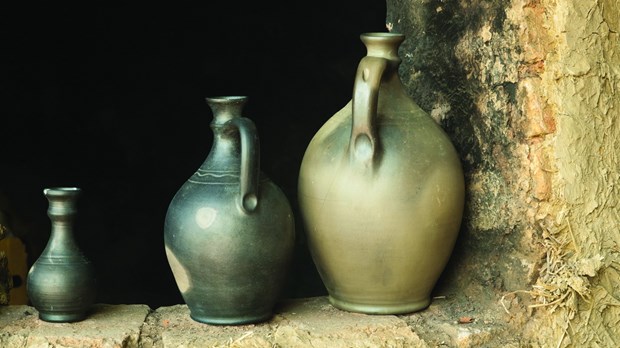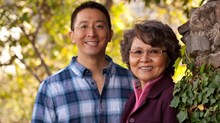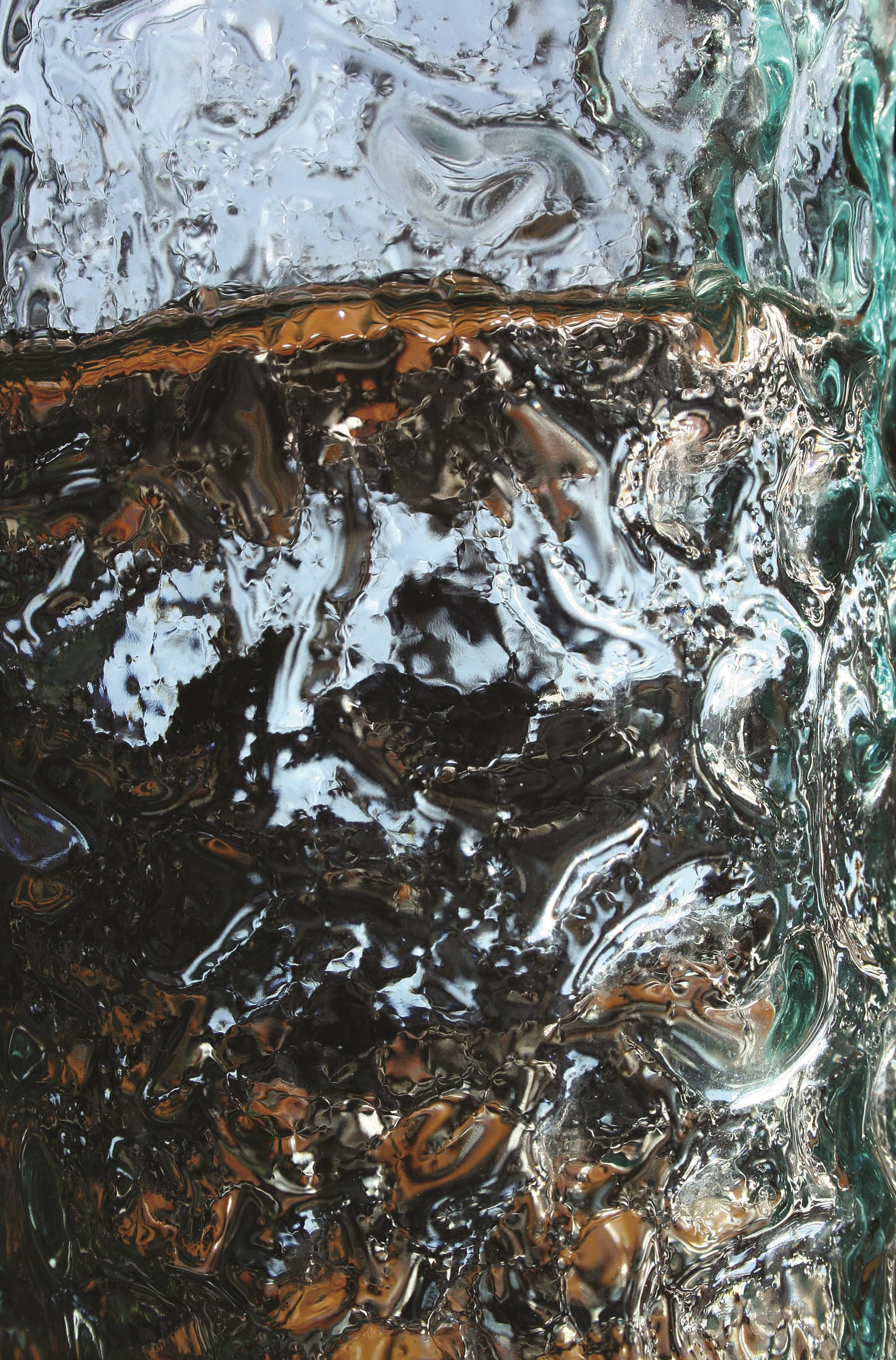Obey Your Thirst

The Bible is drenched in water. In Genesis 1, before any other matter comes into being, we find God's Spirit hovering over the waters. Of the six verses that describe Eden in Genesis 2, four are dedicated to detailing the garden's shimmering rivers. Fast forward all the way to the final chapter of Revelation, and the waters of Eden have been restored: "Then the angel showed me the river of the water of life, as clear as crystal, flowing from the throne of God and of the Lamb" (Revelation 22:1, NIV).
Between Genesis and Revelation, water becomes a powerful symbol of not only purification and renewal, but also, more essentially, of God's presence and provision: "For I will pour water on the thirsty land, and streams on the dry ground," God promises Israel. "I will pour my Spirit upon your offspring, and my blessing on your descendants" (Isaiah 44:3). Thirst, conversely, becomes emblematic of our great and enduring need for God himself. "As the deer pants for streams of water, so my soul pants for you, my God," confesses the psalmist. "My soul thirsts for God, for the living God. When can I go and meet with God?" (Psalm 42:1–2).
Not everyone is as clear-minded as the psalmist about the source of her thirst, of course. The Bible is populated with human beings who seem awfully contemporary in their desperate attempts to quench their longings with everything but God's living water. We meet one such woman in John's gospel, and though we're only given a few key details, it's not hard to imagine her backstory.
The woman at the well
Everyone thinks they know her. But all they really know are the (often exaggerated) statistics: Five husbands, and other men besides.
They've never asked her what it was like to be widowed or divorced more than once. They've never wondered how she's managed to survive successive losses of family and status and dignity. If she is haunted by a sense that there must be something wrong with her to have attracted so much tragedy and abandonment, they are only too happy to tacitly agree. By the time she makes her way into the fourth chapter of John's gospel, the Samaritan Woman has arranged her life to have as little human contact as possible. Even the daily trip to the well for water is carefully timed—no woman in her right mind would make the trek at high noon, the hottest part of the desert day. So that is when she goes.
Her isolation strategies work, until the day she finds a parched traveler resting at the well. Every cultural clue tells her that he's Jewish—no risk of interaction. Even still, she keeps her head down, eyes averted as she dips her pot deep into the waters.
"Will you give me a drink?" the stranger asks (4:7). His tone is courteous, even respectful. But she nearly jumps out of her skin.
"You are a Jew and I am a Samaritan woman. How can you ask me for a drink?" (4:9). The thought of a Jew sharing a Samaritan's drinking jar is unthinkable. Besides, respectable Jewish men make a show of avoiding women of any race in public.
"If you knew the gift of God and who it is that asks you for a drink, you would have asked him and he would have given you living water," he says (4:10), as if he's describing the weather or the price of cattle. It's hard to decide which is odder—what he's just said, or the fact that he's looking directly at her without any hint of lust or contempt.
Normally, she can tell pretty quickly what a man is thinking, but this stranger is an enigma. "Sir," she stammers, buying time, "you have nothing to draw with and the well is deep. Where can you get this living water?" (4:11).
"Everyone who drinks this water will be thirsty again, but whoever drinks the water I give them will never thirst. Indeed, the water I give them will become in them a spring of water welling up to eternal life" (4:13–4).
He's crazy, of course. Possibly homeless. Definitely delusional. She should tell him to have a nice day and be on her way. But he's still catching her gaze with lucid eyes. She decides to play along a little longer.
"Sir, give me this water so that I won't get thirsty and have to keep coming here to draw water" (4:15).
He smiles a little, not unkindly, and says, "Go, call your husband and come back" (4:16).
The muscles in her stomach tighten, and at once she remembers who she is. "I have no husband," she bristles (4:17).
"You are right when you say you have no husband. The fact is, you have had five husbands, and the man you now have is not your husband. What you have just said is quite true" (4:17–18).
She scans the horizon, wondering which of the village gossips briefed him. But there's no one outside in the sweltering heat.
Maybe this man is some sort of prophet. She asks him a question about Samaritan theology, still buying time. As he answers, something strange starts to happen inside of her. A shifting, a softening. All at once there is a groundswell of hope. And before she even knows what she is saying, she blurts out, "I know that Messiah is coming. When he comes, he will explain everything to us" (4:25).
The man is really smiling now, and still looking directly into her eyes. "I, the one speaking to you—I am he" (4:26).
For the first time in John's gospel, Jesus of Nazareth, Son of God, Messiah, has explicitly revealed his true identity to another person. He gives the honor of this inaugural revelation not to the powerful religious or political leaders in Palestine, but to a Samaritan outcast with a checkered past. He offers her living water. And, by all accounts, she drinks it up and is utterly changed.
The Samaritan woman—who started the day outcast and alone—rushes into town and begins to successfully evangelize her entire village. "Come, see a man who told me everything I ever did. Could this be the Messiah?" (4:29), she exclaims. Her transformation is so striking that many come to believe that this Jewish stranger is indeed "the Savior of the world" (4:42).
Our thirst to be known
The exchange between Jesus and the Samaritan woman is hardly the New Testament's flashiest miracle. He simply saw her—really saw her—without needing to possess or manipulate her. And he knew her—her beauty and her courage and her sin and her shame—and loved her. In The Message, her testimony is this: "Come see a man who knew all about the things I did, who knows me inside and out. Do you think this could be the Messiah?" (4:30). Just being known—truly known and loved—was enough of a miracle to change the course of her life.
We should not underestimate the simple but pervasive power of our thirst to be known. Think about how deeply gratifying it is when a friend gives you a gift that shows she really gets you. That one other person really understands you—and likes you anyway—can mean the world.
My friend Barbara tells me that one of the women in her book club declared, "In the first half of my life, I wanted to look good and for people to look up to me. In this second half of my life, I simply want to be known." While we may become more cognizant of our need to be known as we age, the drive is there from the beginning. That thirst to be really seen and understood and accepted is palpable in nightclubs, on social media, and at church home groups. But, no matter how creatively we try to quench that thirst, most of us are still parched. Why?
While human relationships are critically important to our flourishing, other people can never fully satisfy our thirst to be known for two reasons. First, humans hurt each other even (especially) when they love each other—and thus we can never completely let our guards down. Even in our most intimate relationships, there is a need to manage perceptions.
Second, and most essentially, the ultimate reason for our existence is to be known and loved and included in the life of the triune God. It's important to remember that we were not created because God was bored or lonely or wanted to try a science experiment. We were created because the Father, Son, and Spirit had so much love and fellowship and mutual affection and glory between them that they wanted to share it. We are built to participate in that glory—to swim in those waters—and nothing else will do.
The Samaritan woman became truly alive—maybe for the first time in her life—because her thirst to be known was finally quenched by the living water only God can offer.
Our thirst to be filled
If we are made to participate in the fullness of the life and love of the triune God, it should not surprise us to discover that our need to be known is accompanied by a thirst to be filled. Right around the point in mid-life when some people are finally waking up to their longing to be known, others are settling into a despair over a chronic sense of unfulfillment—even while living seemingly full lives.
It's worth noting that John interrupts his typically lean narrative to mention a conspicuous detail: When the Samaritan woman rushed into town, she left her water pot behind (4:28). Having tasted living water, she was ready to abandon her old, inadequate ways of trying to quench her own thirst.
We all have default "water pots"—ways of trying to fill ourselves. Some of us try food or sex or alcohol or drugs. Others of us attempt to make work, ministry, homemaking, or relationships our ultimate source of fulfillment. "Most of us haven't gone through five spouses," acknowledges M. Scott Barnes in his book, Sacred Thirst:
. . . but we have gone through five jobs, five moves, five weight-loss programs, or five churches—and still the insatiable thirst continues. We will never find what we are looking for in the things we pick up along the way. Not even the religious things. Not even important things like relationships. All of these things will leave our souls empty if we try to force them to satisfy our thirst. The true object of our search is nothing less than an encounter with the Holy One.
Six hundred years before the Samaritan woman met Jesus at the well, God urged the Israelites to leave their makeshift water pots behind:
My people have committed two sins:
They have forsaken me, the spring of living water, and have dug their own cisterns, broken cisterns that cannot hold water (Jeremiah 2:13).
Two millennia later, we still have a tendency to use self-made cisterns that leave us empty. But the offer of living water still stands.
Toward the end of the book of Revelation, Christ makes clear to each thirsty one of us what he made plain to the woman at the well. "I am the Alpha and the Omega, the Beginning and the End," he reminds us. And he makes this promise: "To the thirsty I will give water without cost from the spring of the water of life" (Revelation 21:6).
Only that water—living water—will do.
Carolyn Arends is a recording artist (10 albums released), author (3 books published), Christianity Today columnist, college instructor, and theology graduate student. She lives in Vancouver, BC with her husband Mark and their two children. Her latest eBook, Theology in Aisle Seven, is available on http://www.ctebooks.com/. You can get to know her at CarolynArends.com.
Read more articles that highlight writing by Christian women at ChristianityToday.com/Women
 Read These Next
Read These Next
 Capturing the Faces of FamineKenyan photographer Amanda Koech is raising awareness on behalf of those struck by famine in Somalia
Capturing the Faces of FamineKenyan photographer Amanda Koech is raising awareness on behalf of those struck by famine in Somalia Family Time with GodMarch: God's Sacrifice
Family Time with GodMarch: God's Sacrifice
 A Gay Son's Tribute to His MomFor years I ran toward drugs and gay relationships while my mother persisted in prayer and trusted in God's faithfulness.
A Gay Son's Tribute to His MomFor years I ran toward drugs and gay relationships while my mother persisted in prayer and trusted in God's faithfulness.








 Homepage
Homepage



